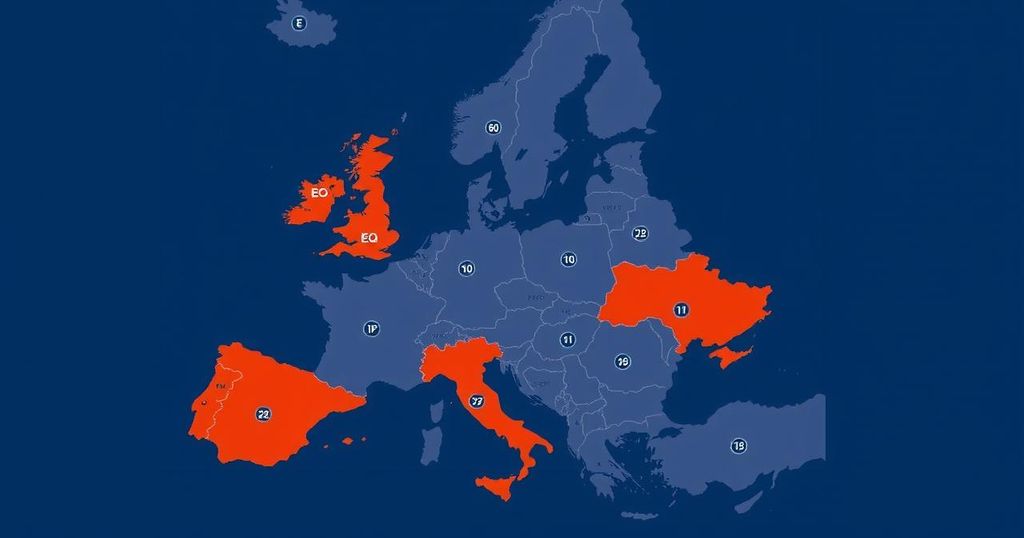The U.S. presidential election between Donald Trump and Kamala Harris bears significant implications for Europe, particularly in the areas of tariffs, business uncertainty, and defense. Trump’s proposed tariffs could weaken EU economies, while Harris may adopt a more diplomatic stance. The outcome will influence Europe’s economic health and geopolitical security, with the election serving as a critical inflection point given current tensions and dependencies in transatlantic relations.
The upcoming U.S. presidential election, featuring candidates Donald Trump and Kamala Harris, carries the potential to significantly influence the future trajectory of Europe. With the continent heavily dependent on the United States for trade and defense, the stakes are particularly high amid current challenges, including economic fluctuations, the ascendance of right-wing nationalism, and security threats following Russia’s invasion of Ukraine. The first area of concern is the imposition of crippling tariffs. The U.S. serves as the largest trading partner of the European Union, facilitating a substantial trade relationship that accounts for millions of jobs and trillions in investments. Trump has indicated plans to implement additional tariffs of 10% to 20%, which could exacerbate economic struggles in the EU, particularly impacting Germany’s export-reliant economy. “Tariffs will seriously dampen the EU’s economic growth,” stated Zach Meyers of the Centre for European Reform. In contrast, Harris is expected to lean towards a more diplomatic approach, encouraging Europe to reduce its economic ties with China, while simultaneously bolstering U.S. manufacturing. Secondly, the potential for business uncertainty is palpable. Many experts express concern that a Trump presidency could usher in a tumultuous economic and geopolitical landscape. As Mario Draghi, former President of the European Central Bank, argued, the EU’s technological and defense competitiveness represents an existential challenge. Harris, as the continuity candidate, may evoke less fear regarding regulatory and economic changes, aiming to protect the EU from the whims of U.S. policymaking. Lastly, defense spending and geopolitical strategy will be crucial. Europe’s dependence on U.S. support has heightened due to Russia-Ukraine tensions. Should Trump win, his historical threats to NATO could undermine European security. In contrast, Harris has expressed a commitment to the transatlantic alliance and supporting Ukraine, suggesting a more stable approach to foreign policy. “The Trump effect on Europe and the EU will be negative—more negative than it would be in the Harris administration,” asserted Steven Blockmans of the Centre for European Policy Studies. In summary, the outcome of the U.S. election will reverberate across Europe, determining not only economic ties but also the geopolitical landscape within which Europe must navigate. The focus on tariffs, business uncertainties, and defense strategies encapsulates the critical nature of this electoral decision.
Europe’s reliance on the United States is pivotal in shaping its economic and security landscape. Historically, U.S.-Europe relations have anchored trade partnerships and defense agreements, especially critical as Europe confronts challenges like economic instability and security threats from Russia. The election of a new U.S. president introduces a variable—a leadership change that could redefine these relationships. The candidates’ differing approaches towards China, tariffs, and NATO create a framework within which Europe’s future could unfold.
In conclusion, the forthcoming U.S. presidential election represents a crucial juncture for Europe. The candidates’ disparate policies on tariffs, business regulations, and defense alliances will significantly shape the continent’s economic and geopolitical future. A Trump administration may bring uncertainties and challenges that could destabilize both trade and security frameworks. Conversely, a Harris administration may offer a more predictable and cooperative approach, fostering EU resilience amid global challenges.
Original Source: fortune.com






